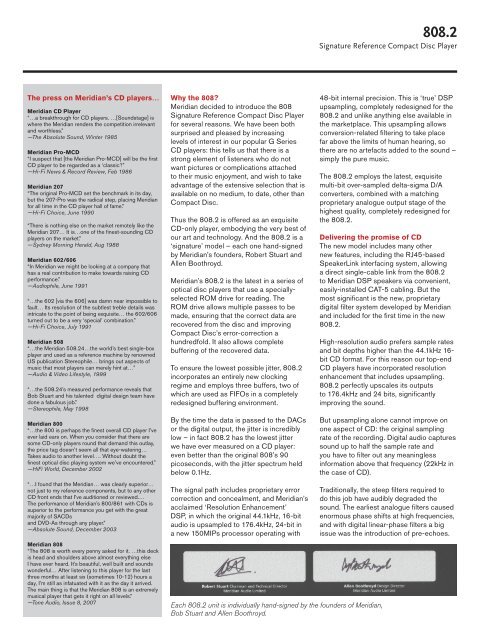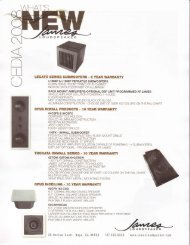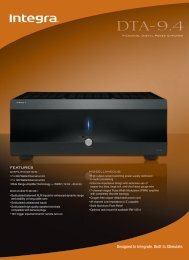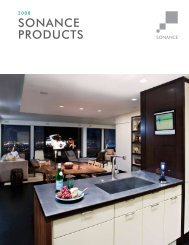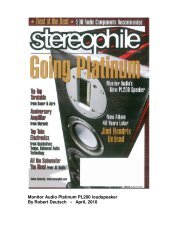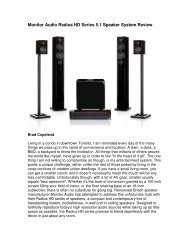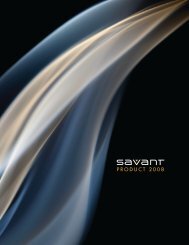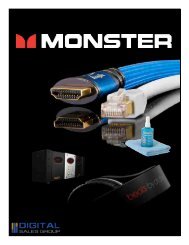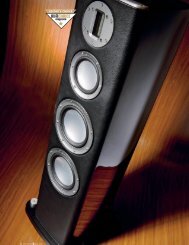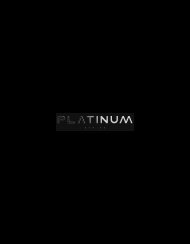The Ideal Combination for Astonishing Sound Quality
meridian brochure.pdf - Digital Sales Group
meridian brochure.pdf - Digital Sales Group
- No tags were found...
You also want an ePaper? Increase the reach of your titles
YUMPU automatically turns print PDFs into web optimized ePapers that Google loves.
808.2<br />
Signature Reference Compact Disc Player<br />
<strong>The</strong> press on Meridian’s CD players…<br />
Meridian CD Player<br />
“…a breakthrough <strong>for</strong> CD players. …[<strong>Sound</strong>stage] is<br />
where the Meridian renders the competition irrelevant<br />
and worthless.”<br />
—<strong>The</strong> Absolute <strong>Sound</strong>, Winter 1985<br />
Meridian Pro-MCD<br />
“I suspect that [the Meridian Pro-MCD] will be the first<br />
CD player to be regarded as a ‘classic’!”<br />
—Hi-Fi News & Record Review, Feb 1986<br />
Meridian 207<br />
“<strong>The</strong> original Pro-MCD set the benchmark in its day,<br />
but the 207-Pro was the radical step, placing Meridian<br />
<strong>for</strong> all time in the CD player hall of fame.”<br />
—Hi-Fi Choice, June 1990<br />
“<strong>The</strong>re is nothing else on the market remotely like the<br />
Meridian 207… It is…one of the finest-sounding CD<br />
players on the market.”<br />
—Sydney Morning Herald, Aug 1988<br />
Meridian 602/606<br />
“In Meridian we might be looking at a company that<br />
has a real contribution to make towards raising CD<br />
per<strong>for</strong>mance.”<br />
—Audiophile, June 1991<br />
“…the 602 [via the 606] was damn near impossible to<br />
fault… Its resolution of the subtlest treble details was<br />
intricate to the point of being exquisite… the 602/606<br />
turned out to be a very ‘special’ combination.”<br />
—Hi-Fi Choice, July 1991<br />
Meridian 508<br />
“…the Meridian 508.24…the world’s best single-box<br />
player and used as a reference machine by renowned<br />
US publication Stereophile… brings out aspects of<br />
music that most players can merely hint at…”<br />
—Audio & Video Lifestyle, 1999<br />
“…the 508.24’s measured per<strong>for</strong>mance reveals that<br />
Bob Stuart and his talented digital design team have<br />
done a fabulous job.”<br />
—Stereophile, May 1998<br />
Meridian 800<br />
“…the 800 is perhaps the finest overall CD player I’ve<br />
ever laid ears on. When you consider that there are<br />
some CD-only players round that demand this outlay,<br />
the price tag doesn’t seem all that eye-watering…<br />
Takes audio to another level…. Without doubt the<br />
finest optical disc playing system we’ve encountered.”<br />
—HiFi World, December 2002<br />
“…I found that the Meridian… was clearly superior…<br />
not just to my reference components, but to any other<br />
CD front ends that I’ve auditioned or reviewed.…<br />
<strong>The</strong> per<strong>for</strong>mance of Meridian’s 800/861 with CDs is<br />
superior to the per<strong>for</strong>mance you get with the great<br />
majority of SACDs<br />
and DVD-As through any player.”<br />
—Absolute <strong>Sound</strong>, December 2003<br />
Meridian 808<br />
“<strong>The</strong> 808 is worth every penny asked <strong>for</strong> it. …this deck<br />
is head and shoulders above almost everything else<br />
I have ever heard. It’s beautiful, well built and sounds<br />
wonderful… After listening to this player <strong>for</strong> the last<br />
three months at least six (sometimes 10-12) hours a<br />
day, I’m still as infatuated with it as the day it arrived.<br />
<strong>The</strong> main thing is that the Meridian 808 is an extremely<br />
musical player that gets it right on all levels.”<br />
—Tone Audio, Issue 8, 2007<br />
Why the 808?<br />
Meridian decided to introduce the 808<br />
Signature Reference Compact Disc Player<br />
<strong>for</strong> several reasons. We have been both<br />
surprised and pleased by increasing<br />
levels of interest in our popular G Series<br />
CD players: this tells us that there is a<br />
strong element of listeners who do not<br />
want pictures or complications attached<br />
to their music enjoyment, and wish to take<br />
advantage of the extensive selection that is<br />
available on no medium, to date, other than<br />
Compact Disc.<br />
Thus the 808.2 is offered as an exquisite<br />
CD-only player, embodying the very best of<br />
our art and technology. And the 808.2 is a<br />
‘signature’ model – each one hand-signed<br />
by Meridian’s founders, Robert Stuart and<br />
Allen Boothroyd.<br />
Meridian’s 808.2 is the latest in a series of<br />
optical disc players that use a speciallyselected<br />
ROM drive <strong>for</strong> reading. <strong>The</strong><br />
ROM drive allows multiple passes to be<br />
made, ensuring that the correct data are<br />
recovered from the disc and improving<br />
Compact Disc’s error-correction a<br />
hundredfold. It also allows complete<br />
buffering of the recovered data.<br />
To ensure the lowest possible jitter, 808.2<br />
incorporates an entirely new clocking<br />
regime and employs three buffers, two of<br />
which are used as FIFOs in a completely<br />
redesigned buffering environment.<br />
By the time the data is passed to the DACs<br />
or the digital output, the jitter is incredibly<br />
low – in fact 808.2 has the lowest jitter<br />
we have ever measured on a CD player:<br />
even better than the original 808’s 90<br />
picoseconds, with the jitter spectrum held<br />
below 0.1Hz.<br />
<strong>The</strong> signal path includes proprietary error<br />
correction and concealment, and Meridian’s<br />
acclaimed ‘Resolution Enhancement’<br />
DSP, in which the original 44.1kHz, 16-bit<br />
audio is upsampled to 176.4kHz, 24-bit in<br />
a new 150MIPs processor operating with<br />
Each 808.2 unit is individually hand-signed by the founders of Meridian,<br />
Bob Stuart and Allen Boothroyd.<br />
48-bit internal precision. This is ‘true’ DSP<br />
upsampling, completely redesigned <strong>for</strong> the<br />
808.2 and unlike anything else available in<br />
the marketplace. This upsampling allows<br />
conversion-related filtering to take place<br />
far above the limits of human hearing, so<br />
there are no artefacts added to the sound –<br />
simply the pure music.<br />
<strong>The</strong> 808.2 employs the latest, exquisite<br />
multi-bit over-sampled delta-sigma D/A<br />
converters, combined with a matching<br />
proprietary analogue output stage of the<br />
highest quality, completely redesigned <strong>for</strong><br />
the 808.2.<br />
Delivering the promise of CD<br />
<strong>The</strong> new model includes many other<br />
new features, including the RJ45-based<br />
SpeakerLink interfacing system, allowing<br />
a direct single-cable link from the 808.2<br />
to Meridian DSP speakers via convenient,<br />
easily-installed CAT-5 cabling. But the<br />
most significant is the new, proprietary<br />
digital filter system developed by Meridian<br />
and included <strong>for</strong> the first time in the new<br />
808.2.<br />
High-resolution audio prefers sample rates<br />
and bit depths higher than the 44.1kHz 16-<br />
bit CD <strong>for</strong>mat. For this reason our top-end<br />
CD players have incorporated resolution<br />
enhancement that includes upsampling.<br />
808.2 perfectly upscales its outputs<br />
to 176.4kHz and 24 bits, significantly<br />
improving the sound.<br />
But upsampling alone cannot improve on<br />
one aspect of CD: the original sampling<br />
rate of the recording. Digital audio captures<br />
sound up to half the sample rate and<br />
you have to filter out any meaningless<br />
in<strong>for</strong>mation above that frequency (22kHz in<br />
the case of CD).<br />
Traditionally, the steep filters required to<br />
do this job have audibly degraded the<br />
sound. <strong>The</strong> earliest analogue filters caused<br />
enormous phase shifts at high frequencies,<br />
and with digital linear-phase filters a big<br />
issue was the introduction of pre-echoes.


